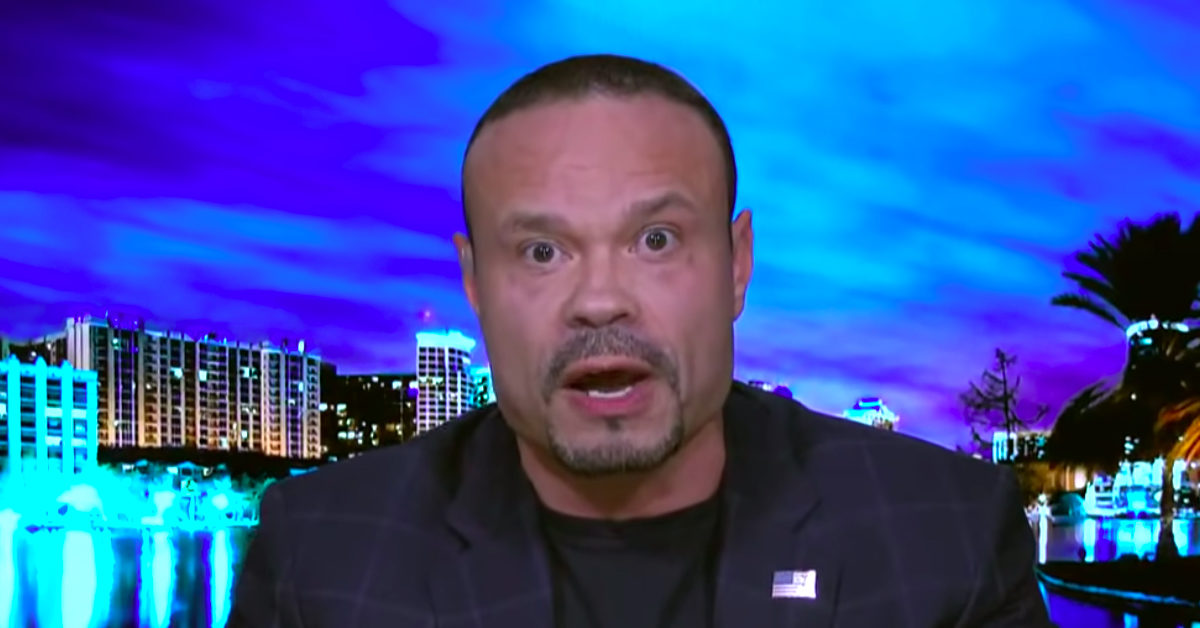 Fox News contributor and right-wing radio host Dan Bongino said House Democrats’ current impeachment inquiry into President Donald Trump’s alleged abuse of power is not a legitimate investigation and should be ignored by the White House. Claiming his statement was clearly supported by the text of the U.S. constitution, Bongino spewed a bizarre semantic argument, concluding that no legitimate impeachment investigation can take place until the House votes on the measure. The former secret service agent attempted to defend his position Saturday against a cadre prominent constitutional law professors who were amusingly bewildered Bongino’s distinctive take on the nation’s founding document.
Fox News contributor and right-wing radio host Dan Bongino said House Democrats’ current impeachment inquiry into President Donald Trump’s alleged abuse of power is not a legitimate investigation and should be ignored by the White House. Claiming his statement was clearly supported by the text of the U.S. constitution, Bongino spewed a bizarre semantic argument, concluding that no legitimate impeachment investigation can take place until the House votes on the measure. The former secret service agent attempted to defend his position Saturday against a cadre prominent constitutional law professors who were amusingly bewildered Bongino’s distinctive take on the nation’s founding document.
Appearing on “Fox and Friends,” Bongino said Trump did not have to respond to any of the Democrats’ requests because they were part of an illegitimate “non-impeachment impeachment.”
“The Constitution’s clear – I know liberals and the House of Representatives on the Democrat side have a tough time with reading comprehension and things like ‘the House of Representatives shall have the sole power to impeach” – which is actually in the Constitution, if they read it,” he explained.
From there, his argument became somewhat difficult to follow.
“If you’ll notice, [the Constitution] doesn’t say the House of Representative. Again, for the liberals who have a tough time with that, that’s plural. That means the House of Representatives, meaning they would take a vote, which they haven’t. So this is not an impeachment,” Bongino concluded.
Professor Josh Chafetz, who teaches constitutional law at the Georgetown University Law Center, bemusingly responded to Bongino’s claims Saturday afternoon, beginning with the plurality component of the “argument.”
“If we’re going to take this unbelievably asinine ‘argument’ at face value, wouldn’t it suffice to note that there are multiple Representative*s* on the committees conducting the investigation?,” Chafetz tweeted, before attacking the substantive issues.
“Of course, that’s all totally beside the point, because the Constitution’s Rules of Proceedings Clause gives each house of Congress the authority to create its own rules of proceedings. Pursuant to that authority, they’ve turned to committees from the earliest days,” he wrote.
“Both subpoena authority and deposition-taking authority have been vested in committees pursuant to cameral rules (which, again, are passed pursuant to the Rules of Proceedings Clause, which is in the Constitution, which folks on Fox News sometimes pretend to care about).”
Chafetz concluded by readdressing Bongino’s plurality claim.
“So, yes, even the House of Representatives—*with an s at the end*!—can delegate these tasks to a committee, and they are no less constitutionally authorized for it.”
Constitutional law professor at the University of Texas School of Law Steve Vladeck unsuccessfully attempted to address Bongino directly, but still felt he should explain the relevant constitutional issue.
“I’d ask [Dan Bongino] to cite the specific provision of the Constitution that requires the House to vote on anything prior to formally approving articles of impeachment, but he’s apparently blocked me,” Vladeck tweeted. “So I’ll just put on my con law professor hat and answer for him: there isn’t one.”
Visiting Harvard Law professor Jennifer Taub also got in on the action, pointing Bongino to Friday’s federal court ruling which explicitly stated that “in cases of presidential impeachment, a House resolution has never, in fact, been required to begin an impeachment inquiry.”
Clearly unhappy with legal academia’s reception of his argument, Bongino put a new spin on President Trump’s “fake news” retort, calling the professors “fake academics.”
https://twitter.com/dbongino/status/1188167480277131266?s=20
[image via Fox News screengrab]